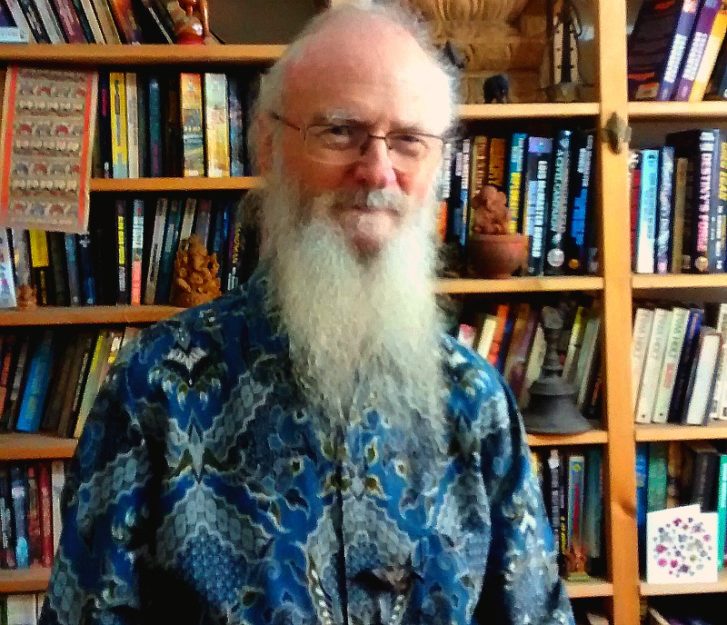“If I could, I would open, right here in Bangalore, a big bookstore dedicated only to science fiction,” said the distinguished, elderly scientist to the crowd gathered at Bookworm bookstore for the release of the science fiction novel The Living Labyrinth, co-authored by him. “I want to do that so more people can read science fiction, so Bangalore will have better engineers,” he added.
Good science fiction — scientifically rigorous, rich in technical detail, where the laws of physics are vital to the story, where the vision of the future is fleshed out in a human context without losing out on cultural or sociological impact — is important for society. Not just for scientists and makers, but for everyone.
The gentleman in question was none other than Tim Poston, multi-disciplinary scientist and mathematician who firmly believes that reading science fiction can lead to a better tomorrow, and that science fiction can help engineers, startups, business leaders, entrepreneurs and ideators be more creative and ambitious. And that isn’t as far-fetched as it may sound at first.

Read this illuminating anecdote author Neil Gaiman recounts in his collection of nonfiction essays, The View from the Cheap Seats:
“A few years ago, in 2007, I went to China for the first-ever, I believe, state-sponsored science fiction convention, and at some point I remember talking to a party official who was there and I said, ‘Up until now I have read in Locus that your lot disapprove of science fiction and you disapprove of science fiction conventions and these things have not been deliberately encouraged. What’s changed? Why did you permit this thing? Why are we here?’ And he said, ‘Oh you know for years, we’ve been making wonderful things. We make your iPods. We make phones. We make them better than anybody else, but we don’t come up with any of these ideas. So we went on a tour of America talking to people at Microsoft, at Google, at Apple, and we asked them a lot of questions about themselves, just the people working there. And we discovered they all read science fiction… so we think maybe it’s a good thing.”

That’s what Tim Poston was getting at, and he did relate this incident as well. And in the decade that has followed since that 2007 state-sponsored scifi convention, China has definitely started creating and not just making. It would be incredulous and silly to claim that all of it is due to the Chinese reading more scifi (no sir!), but as we’ve seen earlier in this column, there’s definitely some kind of a feedback loop between science fiction and technological fact. And to expand its scope, it goes beyond just being inspired by Star Trek communicators to create cellphone technology.
So perhaps that is the way ahead for us as well. Get the government to sponsor a science fiction convention. Go a step further, and include science fiction in school syllabi perhaps? Because I’ve often heard it said that Indians are very good at solving problems, but not as good at spotting the next big problem and coming up with solutions to it. We’re trying to ‘Make in India’, and that’s a good thing, but shouldn’t the larger goal be to create in India?
Not that it doesn’t happen today, but consistently, with a bigger global impact and not just for domestic use? The next big product, the next big startup with a truly original idea. Because to minds exposed to the literature of ideas that is science fiction, there is no saying what passage, technology or vision of the future can spark a revelation or insight.
Take the case of Ben Narasin, who started fashionmall.com in 1993. In a recent article, he spoke of how a single science fiction paperback helped him understand how the then newly born web would evolve, and how that made all the difference. The book in question was Neal Stephenson’s 1992 novel Snow Crash, a part of whose cover is the lead image above, showing the protagonist Hiro Protagonist (yes, that’s his name) about to enter the ‘metaverse’, a future iteration of the internet.
In a recent article, he spoke of how a single science fiction paperback helped him understand how the then newly born web would evolve
While most people trying to commercialise the Web assumed that the Web would be a great egalitarian community where everything was equal and just a click away, Narasin saw, in its portrayal in Snow Crash, a more geographic metaphor — in which the point of entry was the most valuable land and the further away you were from that point, the further you were from your consumers in a lonely neighbourhood. This insight prompted him to spend two years negotiating deals with the points of entry (portals like AOL, Yahoo, Netscape etc.) so that fashionmall.com was closest to the web’s “point of entry” and that was the first step to its success.
Elon Musk and Jeff Bezos are big fans and readers of science fiction, as are Peter Diamandis, Salman Khan (the educator and entrepreneur, not the actor!), Peter Thiel, Larry Page and Sergey Brin (who both count Snow Crash among their personal favourites), and yes, Mark Zuckerberg too. So much so that according to Facebook data scientist Dean Eckles, product managers at Facebook were required to read Snow Crash (explains Facebook’s acquisition of Oculus Rift to build Stephenson’s metaverse, you think?).
According to Facebook data scientist Dean Eckles, product managers at Facebook were required to read Snow Crash
As influential and brilliant as Snow Crash is, it’s just an example here to illustrate the idea that science fiction influences real life technological advancement — for to list out all the other great books, who they’ve influenced, and how would take more words than I’d like to keep you here for.
You never know where science fiction can take you when you look at it as more than just entertainment or a good yarn. The best of science fiction is as enlightening as it is entertaining, and in the hands of the right entrepreneur or ideator, it can be utilitarian as well. And not just in the realm of startups and technology, but in all the sciences. It’s not just for adults but for children as well, sparking their imagination and curiosity, so that tomorrow we won’t just be following or making, but creating.
‘Can science fiction play a role in ushering in a new paradigm?’ The answer, in my very humble opinion, would be an unqualified ‘YES!’. However small the role, it will definitely help make a difference to tomorrow.
Predicting the future can be more hit than miss. For every one thing that science fiction authors predicted that came true, there are dozens that didn’t. But in this regard, it would do well be set aside our cynicism, be a little optimistic and read more science fiction. Well, if in some way it worked for China, it’s well worth giving it a shot. If reading science fiction worked for Zuckerberg, Brin, Bezos, Musk, there’s no reason it couldn’t work for you too.
In his highly influential essay Hazards of Prophecy: The Failure of Imagination, Arthur C. Clarke proposed the first of his three famous laws: ‘When a distinguished but elderly scientist states that something is possible, he is almost certainly right. When he states that something is impossible, he is very probably wrong.’
Tim Poston is – without a doubt – distinguished, elderly and a scientist, and if he states that reading science fiction could play a role in creating better engineers, makers and creators, I would have to agree that he is almost certainly right. I hope you do too.
On that optimistic note, I sign off for this wishing you to live long and prosper. I hope to see you back here next week!
Subscribe to FactorDaily
Our daily brief keeps thousands of readers ahead of the curve. More signals, less noise.
To get more stories like this on email, click here and subscribe to our daily brief.
Disclosure: FactorDaily is owned by SourceCode Media, which counts Accel Partners, Blume Ventures and Vijay Shekhar Sharma among its investors. Accel Partners is an early investor in Flipkart. Vijay Shekhar Sharma is the founder of Paytm. None of FactorDaily’s investors have any influence on its reporting about India’s technology and startup ecosystem.








